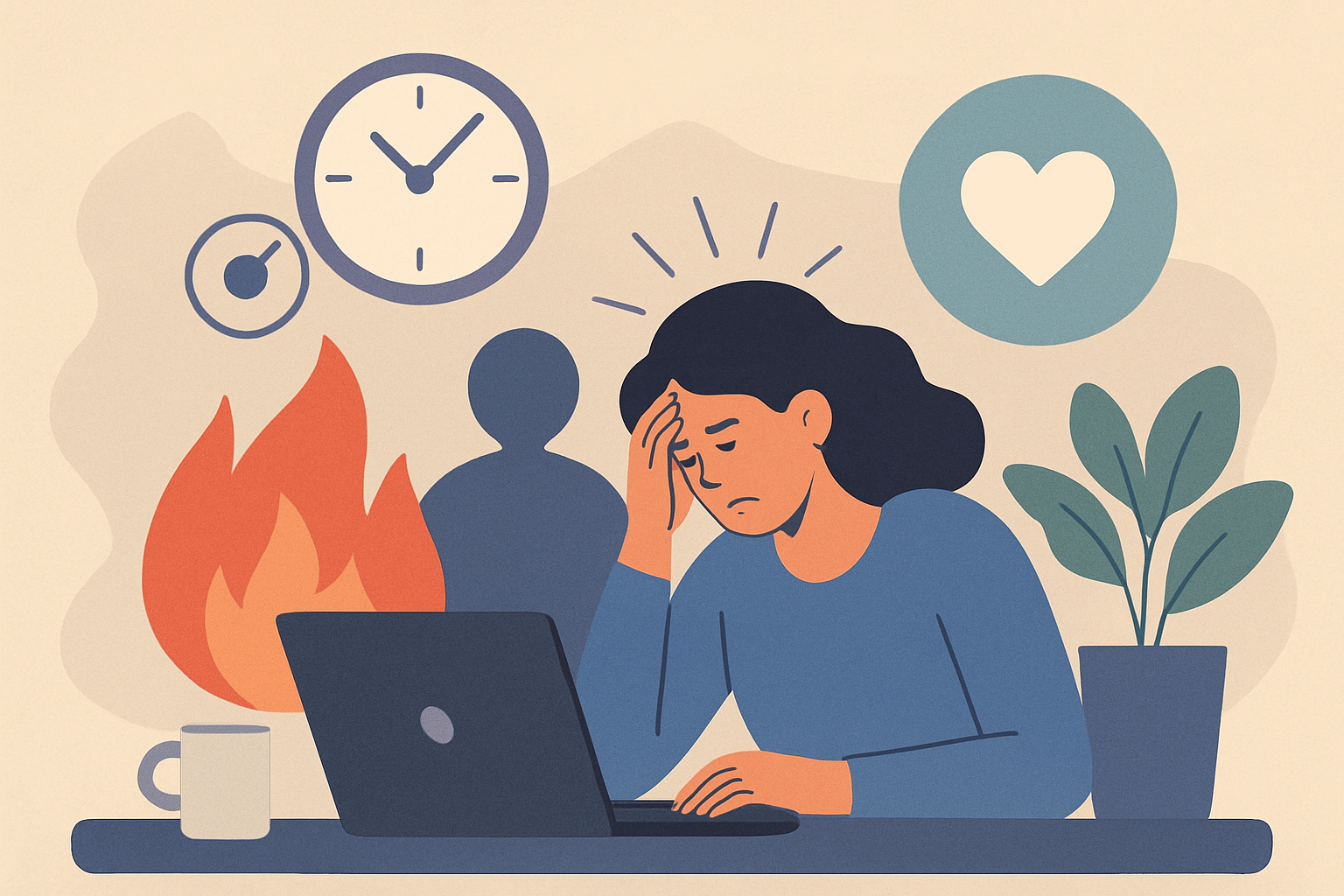Top 10 well-being podcasts for researchers

The pandemic hasn’t been easy for many of us, with it impacting both physical and mental well-being. As a researcher, I haven’t found it easy to cope with anxiety, depression, fear, and stress, especially when I am all alone, surrounded by four walls and panic scrolling through my social media feeds.
I can’t be the only one! The second wave, third wave, exams, writing papers, searching for relevant journals to submit papers, lab work and attending classes—there’s too much happening all at once. We need to sit back and relax!
When there was no one with whom I could share my concerns and ask for help, I stumbled upon these amazing podcasts for researchers, which helped me overcome my anxiety. These might change the way you see your concerns too!
1. The Happiness Lab (https://www.happinesslab.fm/)
Dr. Laurie Santos of Yale University, the host of this academic podcast, believes she can help us find our happiness by sharing inspirational stories. This podcast is based on the psychology course she teaches at Yale. She aims to explain how our minds work by sharing evidence-based insights.
I especially recommend “Help Others to Help Yourself,” (https://bit.ly/Happiness_Lab_Ep_5) an episode where her student, Liam Elkind shares how he fought negative emotions during the pandemic by helping others, and expert, David DeSteno talks about how helping others can improve our well-being.
2. Self-Compassionate Professor (https://bit.ly/Self-compassionate_professor)
This podcast for researchers is hosted by Dr. Danielle De La Mare, where she interviews academic experts who built their careers by overcoming numerous psychological barriers, while being self-compassionate. The objective of this podcast is to help academics find wellness and meaning in their academic lives.
Dr. Danielle works as a career wellness coach, and she helps faculty and academics with their careers by encouraging them to pave creative and meaningful career paths, both within and outside academia.
If you want to re-design your career, then listen to “Take control of your career with Dr. Sarah Hutchinson,” (https://bit.ly/Self-compassionate_prof_Ep_86) an episode that talks about how Dr. Sarah has built her career over time, after struggling for years.
3. Hidden Brain (https://www.npr.org/series/423302056/hidden-brain)
This podcast is hosted by Shankar Vedantam, the social science correspondent of the National Public Radio, who was motivated to take this initiative by his curiosity around “why people behave the way they behave.” In this podcast, he converses with experts from diverse backgrounds and talks about the nuances and complexities of the human mind.
“Being Kind to yourself” (https://bit.ly/Being_kind_to_yourself) is an episode that talks about self-criticism and how it can be fought through self-compassion.
4. The Overwhelmed Brain (https://theoverwhelmedbrain.com/)
The Overwhelmed Brain podcast by Paul Colaianni is a podcast based around on his book “The Overwhelmed Brain: Personal Growth for Critical Thinkers” (https://bit.ly/Book_Overwhelmed_Brain) and philosophy of finding the roots of our emotions.
This academic podcast discusses different aspects of well-being in a relatable way and is aimed at helping listeners to handle difficult situations with ease. If you are overwhelmed with your emotions and don’t know where the source is, this podcast is just for you!
One of the episodes, “Learning to control your own reactions and overreactions” (https://bit.ly/Reactions_Overreactions) talks about how to get a grip of our reactions and deal with difficult situations.
5. Speaking of Psychology (https://www.apa.org/research/action/speaking-of-psychology)
Produced by the American Psychological Association and hosted by Kim I. Mills, ‘Speaking of Psychology’ can serve as a motivational podcast for researchers. It features conversations with psychology experts, explores the depths of human potential, and discusses how to develop social skills.
The episode “Why we’re burned out and what to do about it” (https://bit.ly/Why_were_burned_out) features Dr. Christina Maslach, a psychologist, who addresses the challenges and issues related to occupational “burnout” and talks about ways to tackle it.
6. Happier Podcast with Gretchen Rubin (https://bit.ly/Happier_Gretchen_Rubin)
This podcast, featuring Gretchen Rubin, explores methods to reinvent ourselves and habits that make our lives better, healthier, happier, and more productive.
In the episode “Escape from Zombie Mode, Help People Say ‘No,’ and What Do You Want to be Known for?” (https://bit.ly/Escape_zombie_mode), Rubin converses with an expert about how to quit the habit of agreeing to everything and learn to say “no.”
Gretchen Rubin has been called “the queen of the self-help memoir” by the New York Times.1
7. The Mental Illness Happy Hour (https://mentalpod.com/)
We often come across the phrase, “It’s okay to not be okay,” but how are we supposed to tell whether we’re okay or not? This podcast has got you covered with some inspiring and interesting conversations around well-being that help people identify their mental health challenges.
Comedian Paul Gilmartin hosts this weekly, hour-long podcast, where he interviews experts, doctors, comedians, and artists from diverse backgrounds, and gets insights into their trauma, fear, and negative thinking. This is not just a podcast for researchers, but for anyone who wants to improve their mental well-being.
The episode “Anxiety” (https://mentalpod.com/archives/5883) features Joe List, a comedian and a podcaster, where he shares his experiences of anxiety and panic attacks, and how he deals with these issues by asking for help.
8. Not Another Anxiety Show (https://www.stitcher.com/show/not-another-anxiety-show)
In this podcast, host and registered nurse, Kelli Walker converses with guests about anxiety and provides tips on broader self-care practices and overcoming anxiety through positive thinking.
In the episode “Being a Highly Sensitive Person with April Snow” (https://bit.ly/Episode_April_Snow), Walker and licensed psychotherapist, April Snow, talk about what it means to be a Highly Sensitive Person (HSP), how one can identify oneself as an HSP, how anxiety is related to HSP, and how to overcome anxiety as an HSP.
9. The Mindset Mentor (https://robdial.com/podcast/)
This podcast talks about how the mind and the body work together in different scenarios. It features Rob Dial as the host and discusses a range of factors that can affect mental health in addition to strategies to deal with our negative thoughts.
“How to Destroy Negative Self Talk” (https://bit.ly/Ep_Negative_Self-Talk) is one of many such episodes of this academic podcast, where Rob talks about positive ways to structure our lives.
10. The SOS show with Suchita (https://eplog.media/show/the-sos-show-with-suchita)
Produced by Ep.Log Media & Metaphysical Lab and hosted by Suchita Bhhatia, the SOS podcast talks about and demystifies misconceptions around mental health. Suchita converses with experts—“the fighters” and “the fearless ones”— about how they break taboos around mental health, which are created in and by our cultural ecosystem.
Biases exist in all human societies and inevitably influence how one thinks and expresses oneself. If you are struggling to deal with biases in academic workplace, listen to “How Can Human Biases Affect One’s Mental Health/Wellbeing?” (https://bit.ly/SOS_Show_Ep_79), an episode that talks about how biases affect one’s well-being and how to act in such difficult situations.
These are ten of the many podcasts that talk about issues related to mental health and provide insights into the practice of self-compassion, self-love, and self-care. They also provide strategies to manage mental health and a platform for fostering meaningful conversation.
In addition to practicing self-care, researchers can also seek and be part of communities or forums that foster positive engagement with other researchers who share similar challenges as academics. Researcher.Life is one such platform hosting an ecosystem of services and support systems that can help researchers with different aspects of their careers and life.
Reference
1. Tuhus-Dubrow, R. I Change, You Change. The New York Times (2013)





